Summer of 69: Bryan Adams
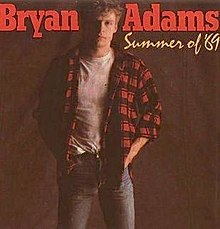 is a song recorded by the Canadian musician Bryan Adams, from his fourth album, Reckless (1984).
is a song recorded by the Canadian musician Bryan Adams, from his fourth album, Reckless (1984).
The song was written by Adams and Jim Vallance, a long-time writing partner of Adams. “Summer of ’69” was produced by Adams and Bob Clearmountain.
It was released in June 1985 under A&M Records as the fourth single from Reckless. “Summer of ’69” is an up-tempo rock song.
1969 Songs
In the Year 2525: Zager and Evans
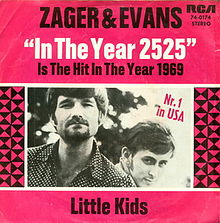 Is a 1968 hit song by the American pop-rock duo of Zager and Evans. It reached number one on the Billboard Hot 100 for six weeks commencing July 12, 1969. It peaked at number one in the UK Singles Chart for three weeks in August and September that year. The song was written and composed by Rick Evans in 1964 and originally released on a small regional record label (Truth Records) in 1968. Zager and Evans disbanded in 1971.
Is a 1968 hit song by the American pop-rock duo of Zager and Evans. It reached number one on the Billboard Hot 100 for six weeks commencing July 12, 1969. It peaked at number one in the UK Singles Chart for three weeks in August and September that year. The song was written and composed by Rick Evans in 1964 and originally released on a small regional record label (Truth Records) in 1968. Zager and Evans disbanded in 1971.
Zager and Evans were a one-hit wonder, recording artists who had a number one hit and then never had another chart single. They did this in both the U.S. Billboard Hot 100 and the UK Singles Chart, which is rare. As of 2018, they were the only artist ever to have a chart-topping #1 hit on both sides of the Atlantic and never have another chart single in Billboard or in the UK for the rest of their career. Their follow-up single on RCA-Victor, “Mr. Turnkey”, failed to hit the main music charts on either side of the Atlantic Ocean. Another single, “Listen to the People”, managed to make the bottom slot of the Cashbox chart at number 100.
Get Back: The Beatles
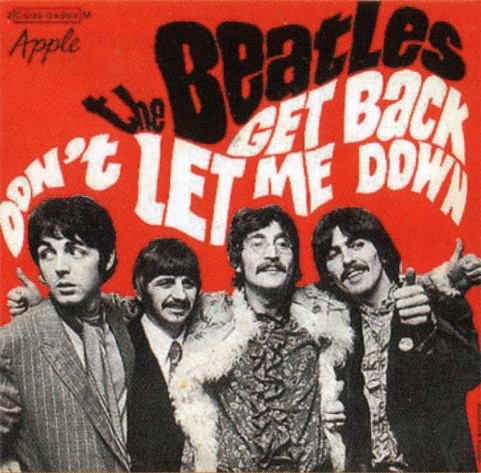 is a song recorded by the British rock band the Beatles and written by Paul McCartney (though credited to Lennon–McCartney), originally released as a single on 11 April 1969 and credited to “The Beatles with Billy Preston”.
is a song recorded by the British rock band the Beatles and written by Paul McCartney (though credited to Lennon–McCartney), originally released as a single on 11 April 1969 and credited to “The Beatles with Billy Preston”.
A different mix of the song later became the closing track of Let It Be (1970), which was the Beatles’ last album released just after the group split. The single version was later issued on the compilation albums 1967–1970, 20 Greatest Hits, Past Masters, and 1.
The single reached number one in the United Kingdom, the United States, Ireland, Canada, New Zealand, the Netherlands, Australia, France, West Germany, Mexico, Norway, Switzerland, Austria, and Belgium. It was the Beatles’ only single that credited another artist at their request. “Get Back” was the Beatles’ first single release in true stereo in the US. In the UK, the Beatles’ singles remained monaural until the following release, “The Ballad of John and Yoko”.
Green River: Creedence Clearwater Revival
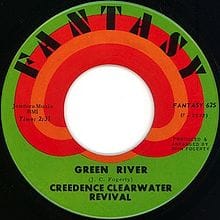
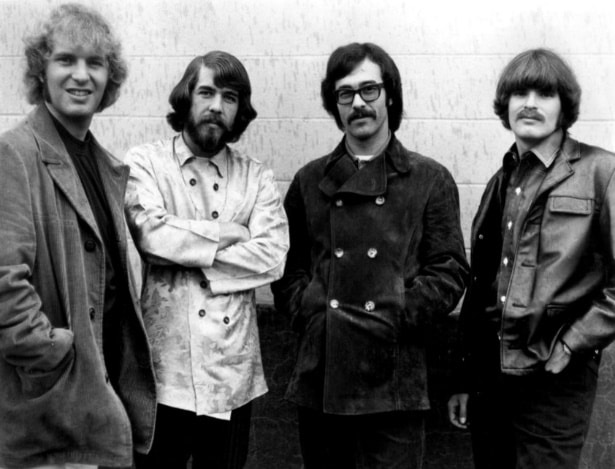
is a song by American rock band Creedence Clearwater Revival. The song was written by John Fogerty and was released as a single in July 1969, one month before the album of the same name was released.
Something in the Air: Thunderclap Newman
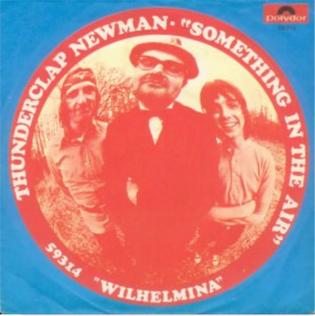
Is a song recorded by Thunderclap Newman, written by Speedy Keen who also sang the song. It was a No. 1 single for three weeks in the UK Singles Chart in July 1969. The song has been used for films, television and adverts, and has been covered by several artists. The track was also included on Thunderclap Newman’s only album release Hollywood Dream over a year later.
Sweet Caroline: Neil Diamond
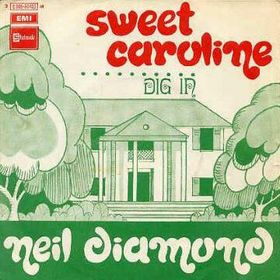
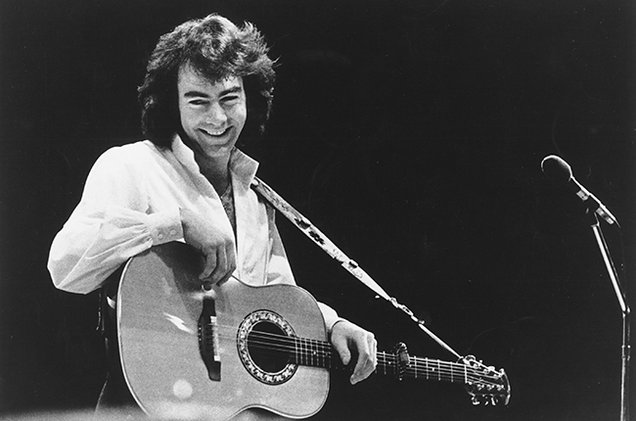
Is a song written and performed by American recording artist Neil Diamond and released in June 1969 as a single with the title “Sweet Caroline (Good Times Never Seemed So Good)“. It was arranged by Charles Calello, and recorded at American Sound Studio in Memphis, Tennessee.
The song reached No. 4 on the Billboard Hot 100 chart the week ending August 16, 1969, and was certified gold by the RIAA on August 18, 1969, for sales of one million singles. “Sweet Caroline” was also the first of fifty-eight entries on the US Easy Listening chart, peaking at #3.
In the autumn of 1969, Diamond performed “Sweet Caroline” on several television shows. It later reached No. 8 on the UK singles chart in 1971.
More Today Than Yesterday: Spiral Staircase
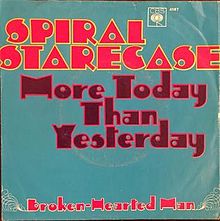
is a song written by Pat Upton and performed by Spiral Starecase. It reached number 6 in Canada, number 7 on the Cashbox Top 100, and number 12 on the Billboard Hot 100 in 1969. It was also released in the United Kingdom as a single, but did not chart. The song was featured on their 1969 album, More Today Than Yesterday.
Produced by Sonny Knight and arranged by Al Capps, it ranked number 50 on Billboard magazine’s Top Hot 100 songs of 1969.
The principal idea of the song was made famous at the turn of the 20th century in a poem by Rosemonde Gérard, the wife of the poet and playwright Edmond Rostand (Cyrano de Bergerac).
Galveston: Glen Campbell
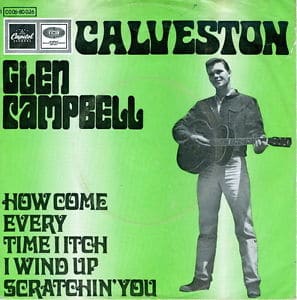
Is a song written by Jimmy Webb and popularized by American country music singer Glen Campbell who recorded it with the instrumental backing of members of The Wrecking Crew. In 2003, this song ranked number 8 in CMT’s 100 Greatest Songs in Country Music. Campbell’s version of the song also went to number 1 on the country music charts. On other charts, “Galveston” went to number 4 on the Billboard Hot 100 and number one on the “Easy Listening” charts. It was certified gold by the RIAA in October 1969.
The song is considered by many to be the unofficial anthem of Galveston Island and the City of Galveston, Texas
Campbell’s recording of the song, released in 1969, was perceived as being a Vietnam War protest song, but Campbell performed it up-tempo, conveying a more general message. The protagonist is a soldier, as shown in the original promo video with Campbell dressed up in a military outfit. Webb described it as an anti-war song and challenged Campbell’s version of his song and the notion that it was in any way a “patriotic song”. According to Webb, the song is “about a guy who’s caught up in something he doesn’t understand and would rather be somewhere else”.
This Magic Moment: Jay and the Americans
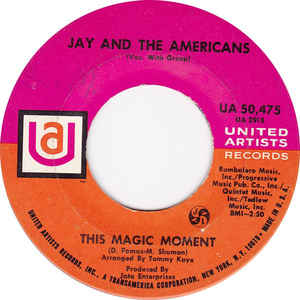
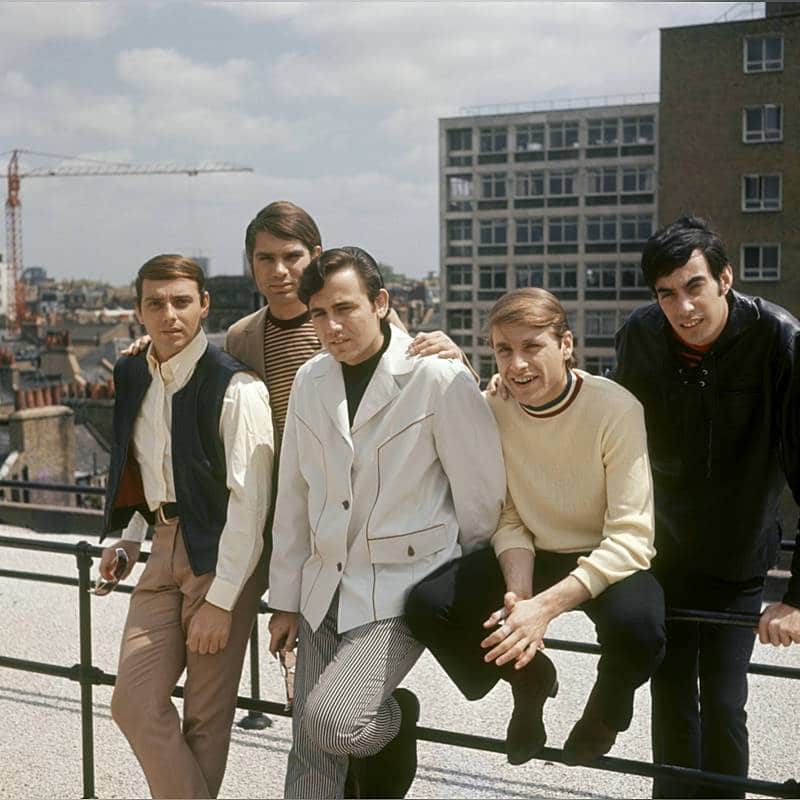
is a song composed by lyricist Doc Pomus and pianist Mort Shuman, and is one of their best-known songs.
In 1968, Jay and the Americans released a version of the song, which became the song’s most widely successful release. Their version spent 14 weeks on the Billboard Hot 100, reaching No. 6 on March 1, 1969, while reaching No. 1 on Canada’s “RPM 100″ and No. 11 on Billboard‘s Easy Listening chart. The song also debuted at No. 4 in the first issue of RPM‘s “Young Adult” adult contemporary chart. The single earned gold record status from the Recording Industry Association of America.
Honky Tonk Women: The Rolling Stones
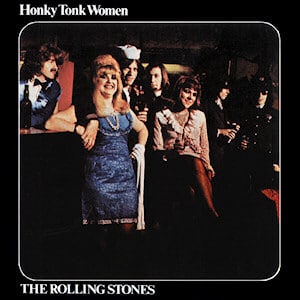
is a 1969 hit song by the Rolling Stones. It was a single-only release, available from 4 July 1969 in the United Kingdom, and a week later in the United States (although a country version called “Country Honk” was later included on the album Let It Bleed). It topped the charts in both nations.
The song was written by Mick Jagger and Keith Richards while on holiday in Brazil from late December 1968 to early January 1969, inspired by Brazilian “caipiras” (inhabitants of rural, remote areas of parts of Brazil) at the ranch where Jagger and Richards were staying in Matão, São Paulo. Two versions of the song were recorded by the band: the familiar hit which appeared on the 45 single and their collection of late 1960s singles, Through the Past, Darkly (Big Hits Vol. 2); and a honky-tonk version entitled “Country Honk” with slightly different lyrics, which appeared on Let It Bleed (1969).
Thematically, a “honky tonk woman” refers to a dancing girl in a western bar who may work as a prostitute, the setting for the narrative in the first verse of the rock-and-roll version is Memphis, Tennessee: “I met a gin soaked bar-room queen in Memphis”, while “Country Honk” sets the first verse in Jackson, Mississippi: “I’m sittin’ in a bar, tipplin’ a jar in Jackson”.
The band initially recorded the track called “Country Honk,” in London in early March 1969. Brian Jones was present during these sessions and may have played on the first handful of takes and demos. It was his last recording session with the band. The song was transformed into the familiar electric, riff-based hit single “Honky Tonk Women” sometime in the spring of 1969, prior to Mick Taylor’s joining the group. In an interview in the magazine Crawdaddy!, Richards credits Taylor for influencing the track: “… the song was originally written as a real Hank Williams/Jimmie Rodgers/1930s country song. And it got turned around to this other thing by Mick Taylor, who got into a completely different feel, throwing it off the wall another way.” However, in 1979 Taylor recalled it this way: “I definitely added something to Honky Tonk Women, but it was more or less complete by the time I arrived and did my overdubs.”
“Honky Tonk Women” is distinctive as it opens not with a guitar riff, but with a beat played on a cowbell. The Rolling Stones’ producer Jimmy Miller performed the cowbell for the recording.
One: Three Dog Night
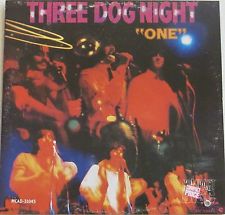
is a song written by Harry Nilsson and made famous by Three Dog Night whose recording reached number five on the U.S. Billboard Hot 100 in 1969 and number four in Canada. The song is known for its opening line “One is the loneliest number that you’ll ever do”.
“One” is written in the key of F minor and was released as the second single from Three Dog Night’s eponymous first album. It became their first of seven gold records over the next five years.
The song reached number five on the U.S. Billboard Hot 100 and spent three weeks at number two on the Cash Box Top 100. It also reached number four in Canada.
Get Together: The Youngbloods
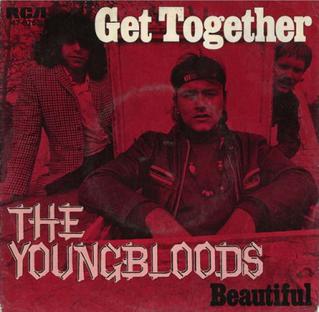
Is a song written in the mid-1960s by American singer-songwriter Chet Powers.
The song is an appeal for peace and brotherhood, presenting the polarity of love versus fear, and the choice to be made between them. It is best remembered for the impassioned plea in the lines of its refrain (“Come on people now/Smile on your brother/Everybody get together/Try to love one another right now”), which is repeated several times in succession to bring the song to its conclusion.
In 1967, the Youngbloods released their version of the song under the title “Get Together”. It became a minor Hot 100 hit for them, peaking at number 62 and reaching 37 on the US adult contemporary chart. However, renewed interest in the Youngbloods’ version came when it was used in a radio public service announcement as a call for brotherhood by the National Conference of Christians and Jews. The Youngbloods’ version, the most-remembered today, was re-released in 1969, peaking at number 5 on the Billboard Hot 100.
Things I’d Like to Say: The New Colony Six
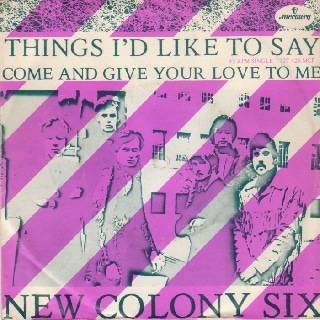
is a song by the American rock band New Colony Six, released in 1968 on their album Revelations and as a single. The song became a top 20 hit in the U.S., peaking at number 16 on the Billboard Hot 100 and at number 13 on the Cash Box Top 100 Singles chart, and a top 10 hit in Canada, peaking at number 6 on the RPM Top Singles chart. It also peaked at number 2 on the WLS survey in the band’s home city of Chicago.
The song also peaked at number 17 on the Billboard Easy Listening chart and at number 7 on the RPM Adult Contemporary chart.
Games People Play: Joe South
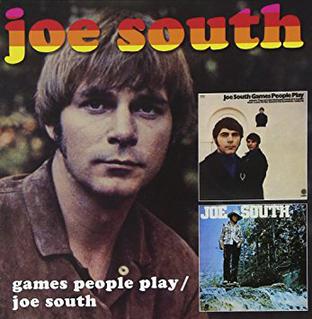
is a song written, composed, and performed by American singer-songwriter Joe South, released in August 1968, that won the Grammy Award for Best Contemporary Song and the Grammy Award for Song of the Year.
“Games People Play” is a protest song whose lyrics speak against various forms of irresponsibility, hatred, hypocrisy, inhumanity, and intolerance in both interpersonal and social interactions between people. Billboard favorably reviewed the song some three months after its release and eight weeks before it finally reached the Hot 100.
The song was released on South’s debut album Introspect and as a single, reaching #12 on the Hot 100. It was also a #6 hit in the UK in 1969, #4 in Ireland, and won the Grammy Award for Best Contemporary Song and the Grammy Award for Song of the Year
